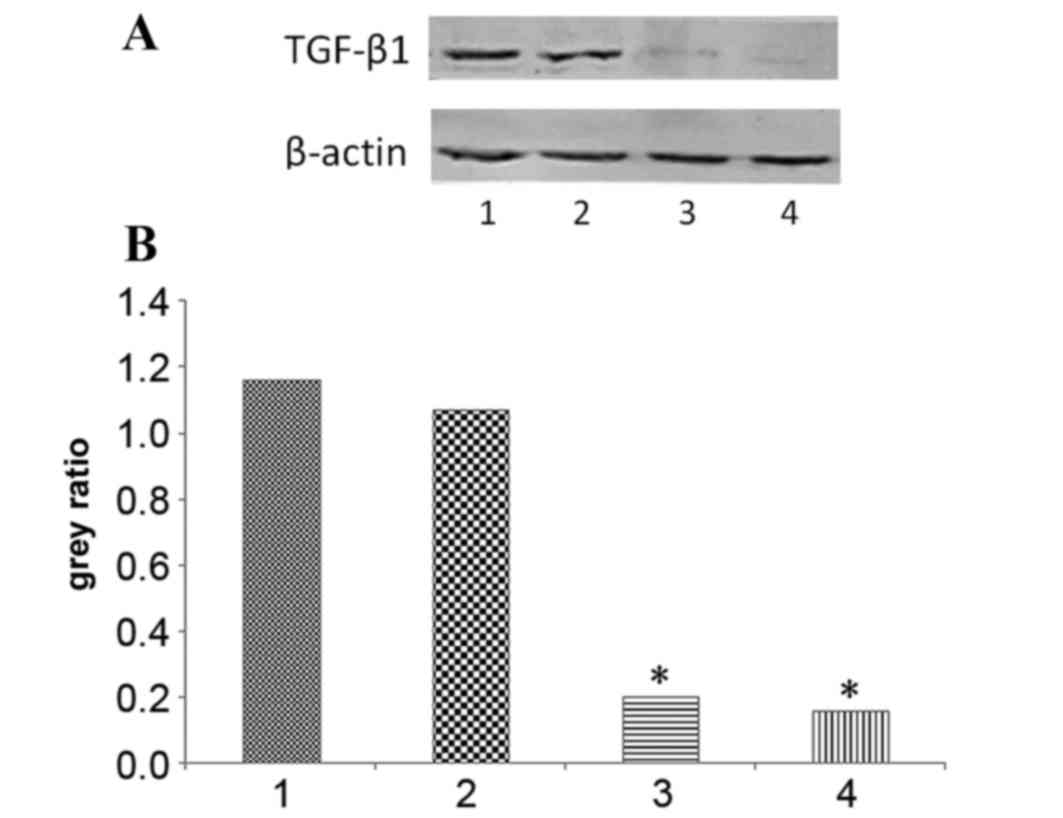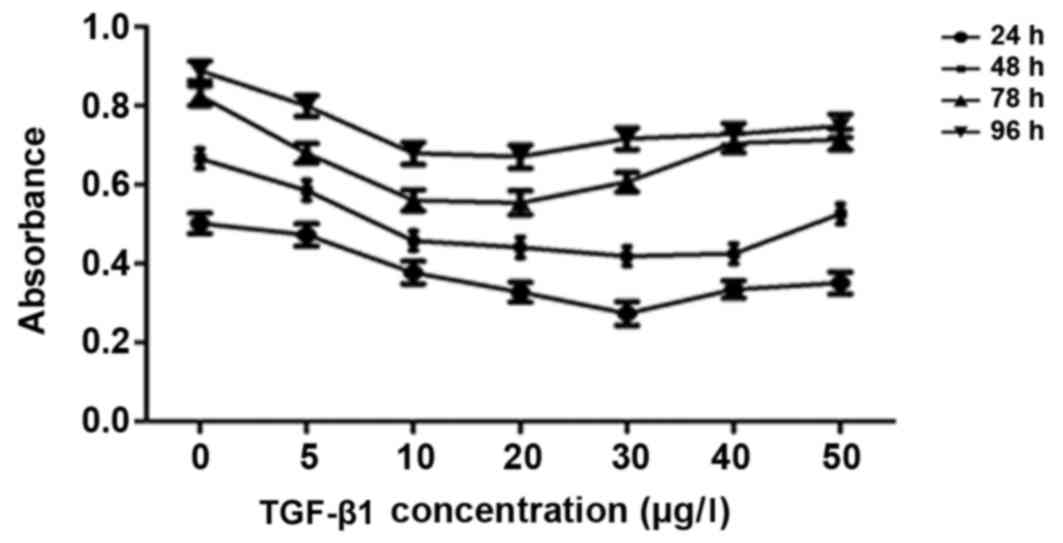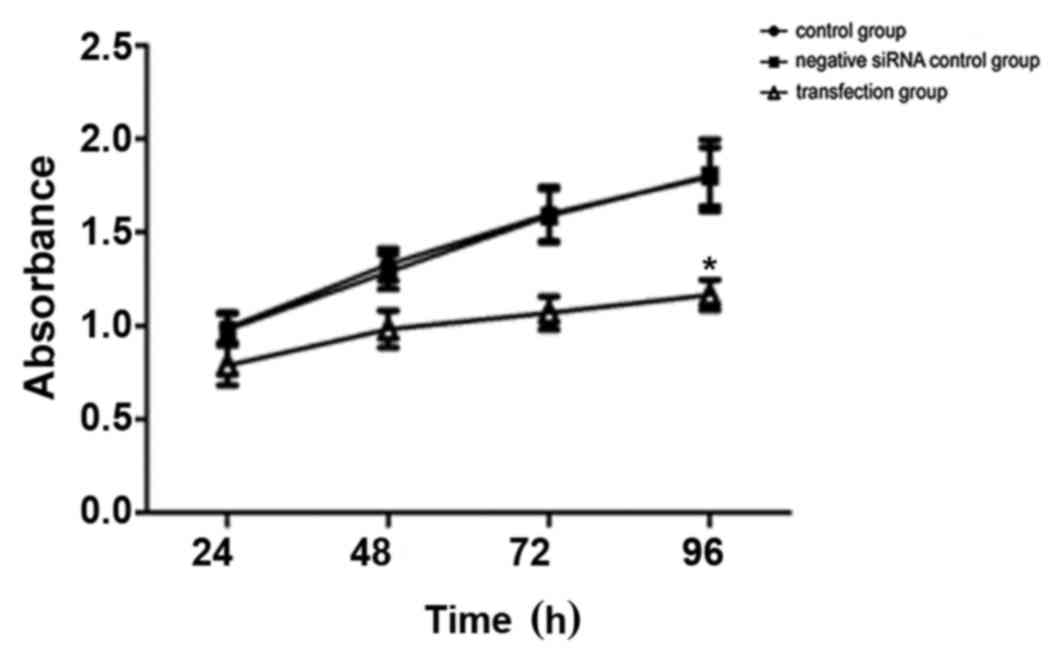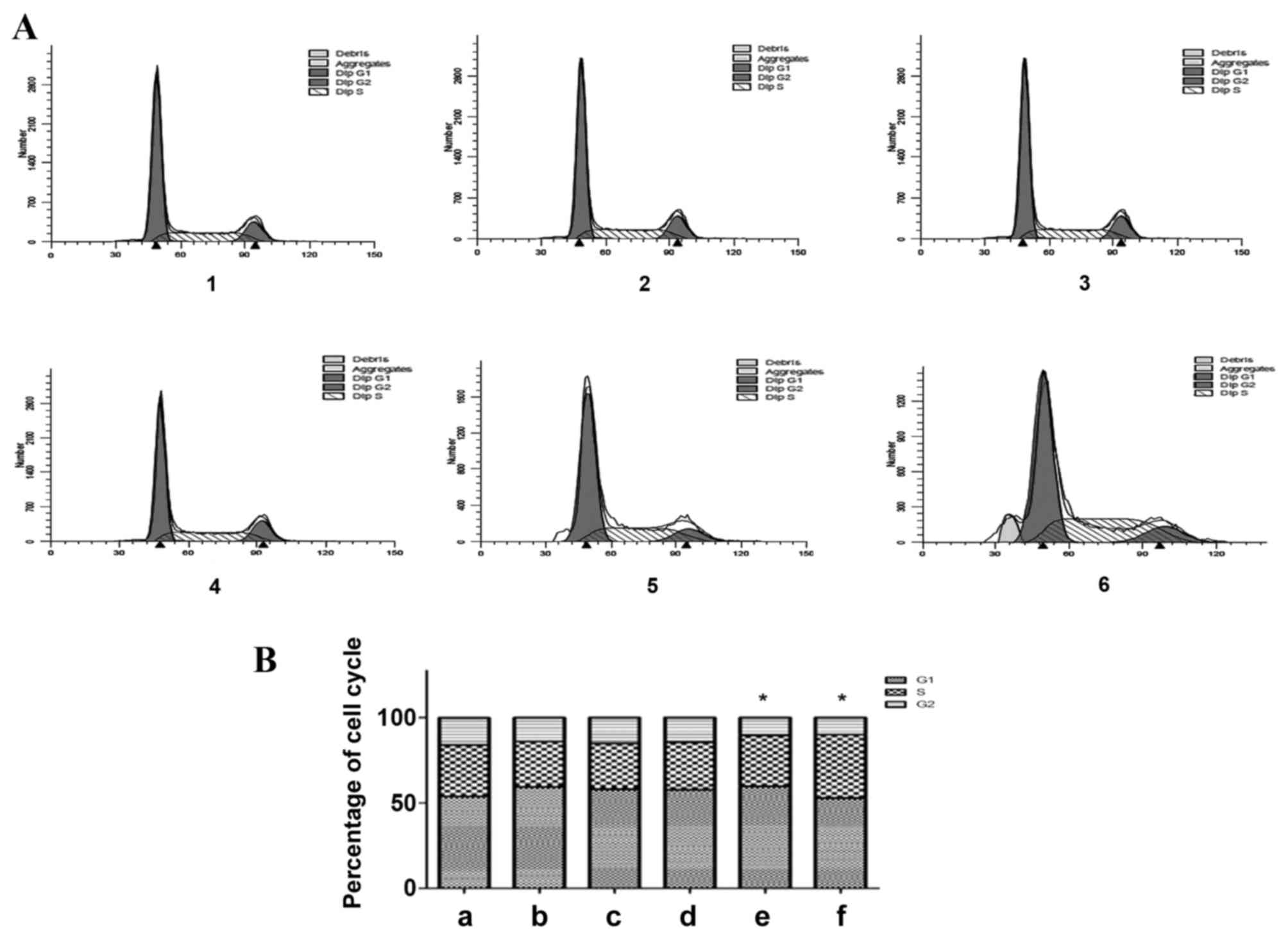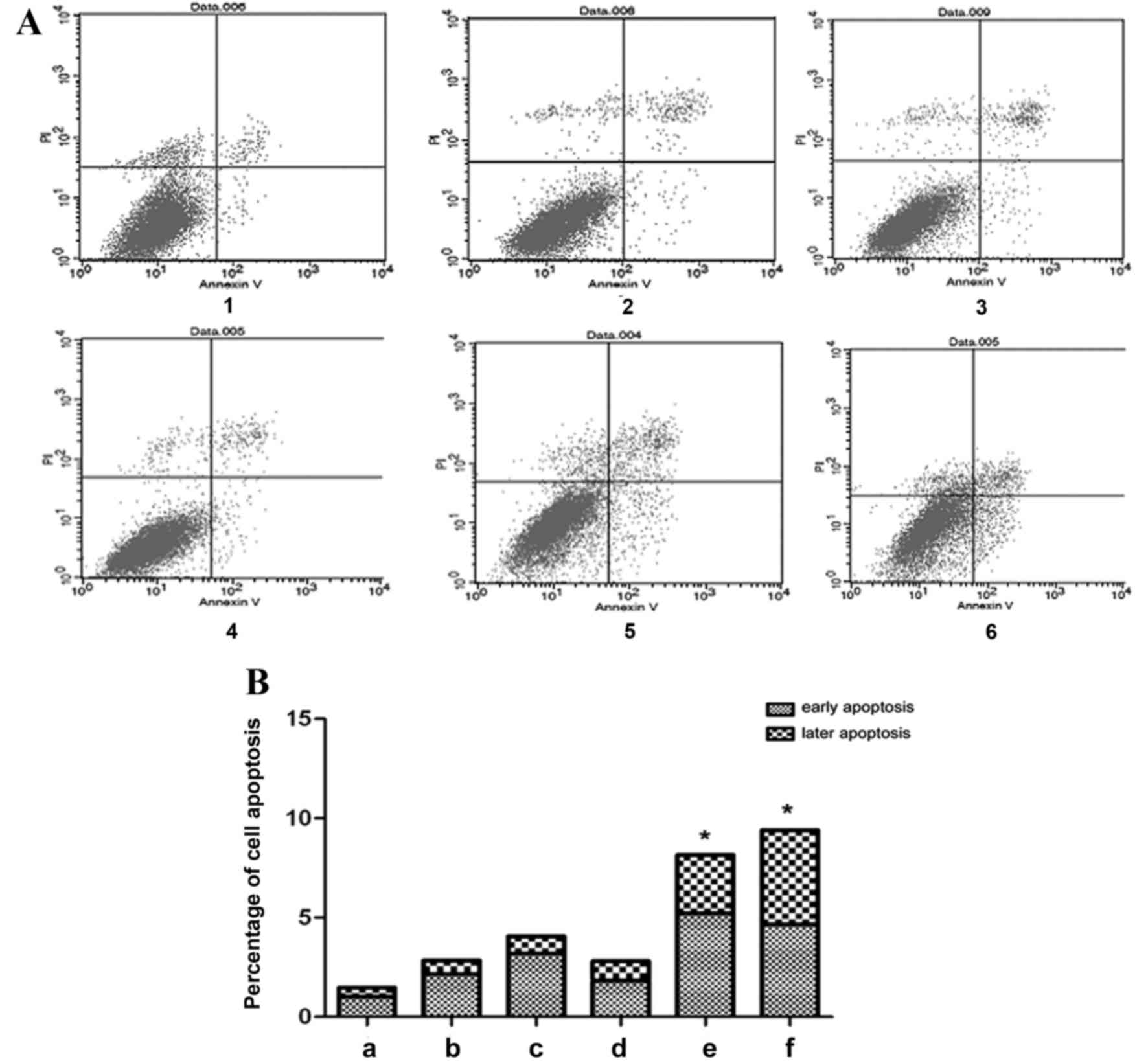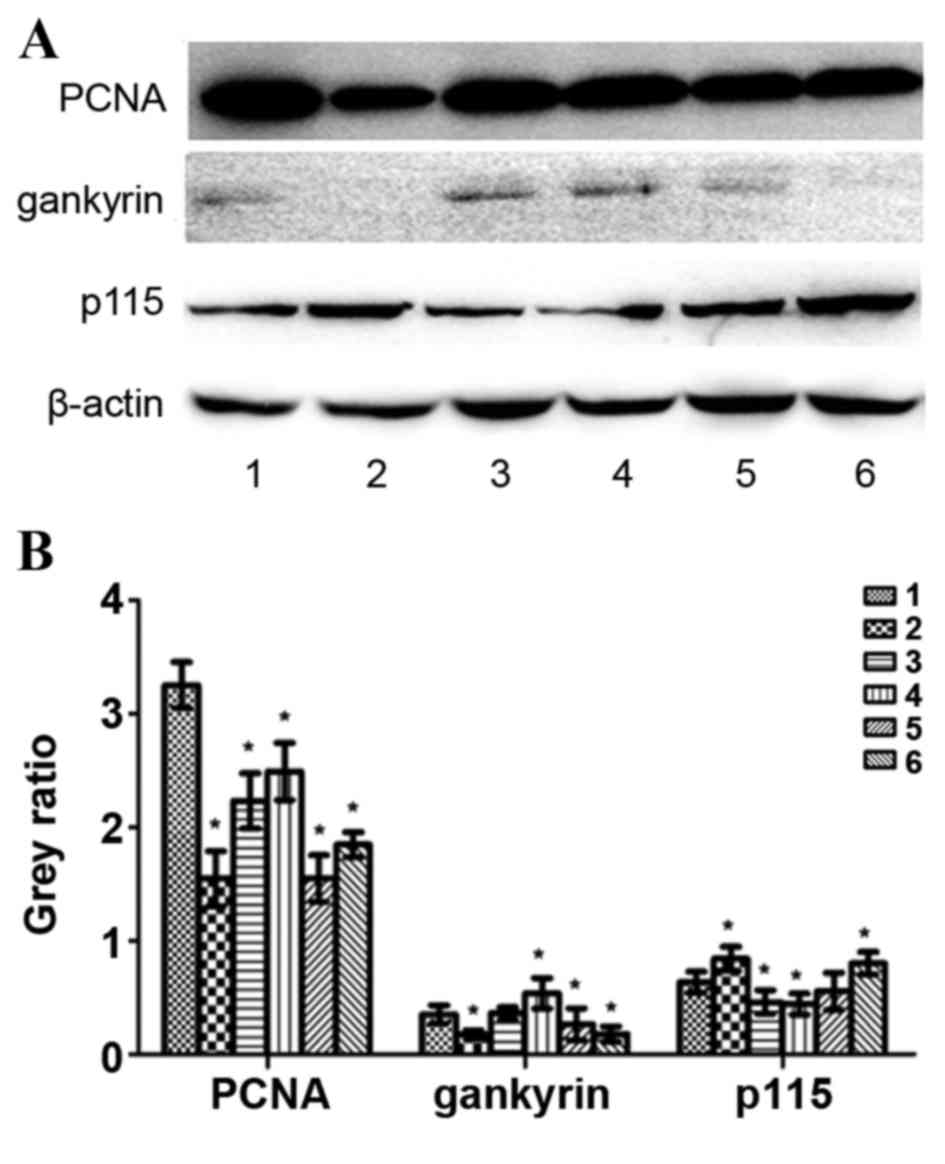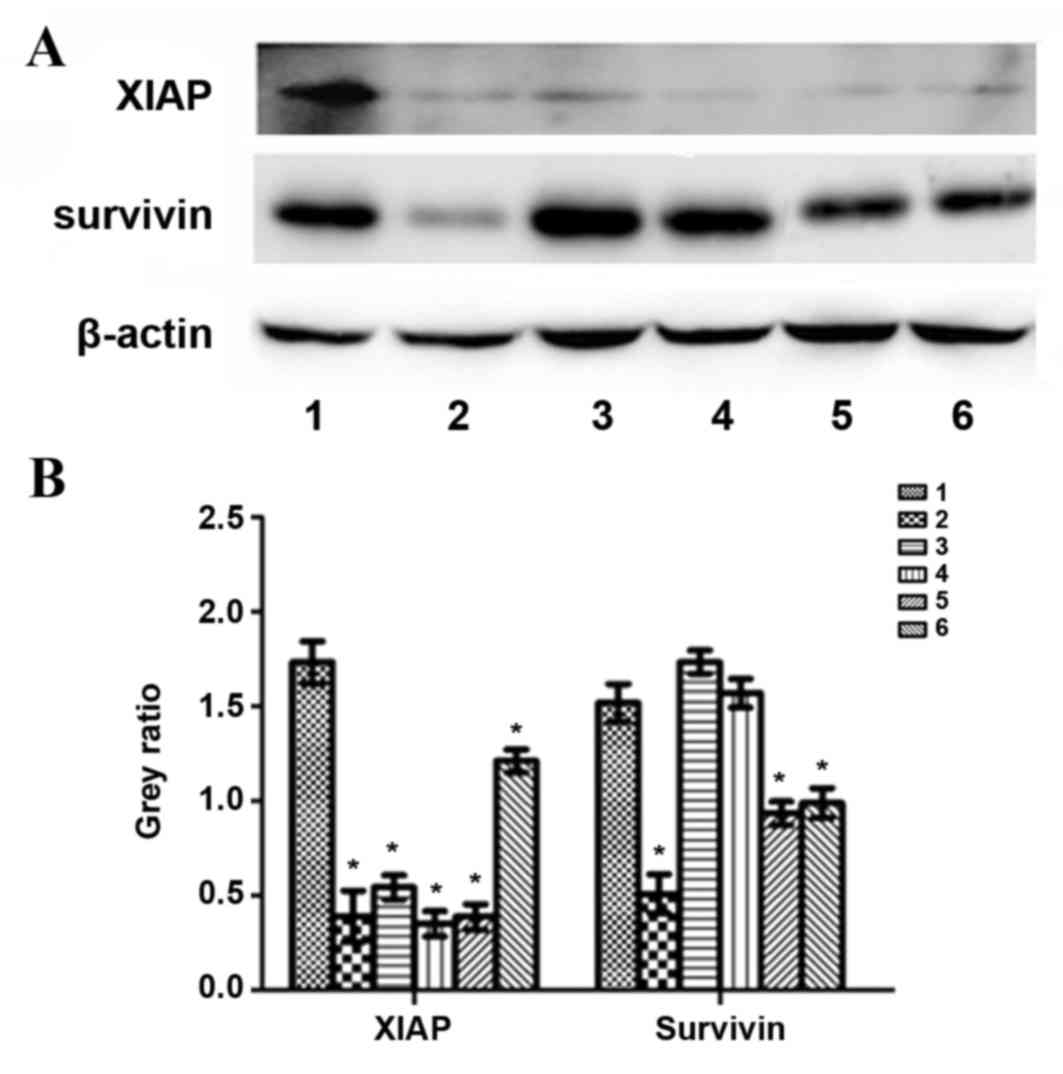|
1
|
Balzarini P, Benetti A, Invernici G,
Cristini S, Zicari S, Caruso A, Gatta LB, Berenzi A, Imberti L,
Zanotti C, et al: Transforming growth factor-beta1 induces
microvascular abnormalities through a down-modulation of neural
cell adhesion molecule in human hepatocellular carcinoma. Lab
Invest. 92:1297–1309. 2012. View Article : Google Scholar : PubMed/NCBI
|
|
2
|
Monga SP: β-catenin signaling and roles in
liver homeostasis, injury, and tumorigenesis. Gastroenterology.
148:1294–1310. 2015. View Article : Google Scholar : PubMed/NCBI
|
|
3
|
Huang JL, Ren TY, Cao SW, Zheng SH, Hu XM,
Hu YW, Lin L, Chen J, Zheng L and Wang Q: HBx-related long
non-coding RNA DBH-AS1 promotes cell proliferation and survival by
activating MAPK signaling in hepatocellular carcinoma. Oncotarget.
6:33791–33804. 2015.PubMed/NCBI
|
|
4
|
Tang H, Li RP, Liang P, Zhou YL and Wang
GW: miR-125a inhibits the migration and invasion of liver cancer
cells via suppression of the PI3K/AKT/mTOR signaling pathway. Oncol
Lett. 10:681–686. 2015.PubMed/NCBI
|
|
5
|
Zhao H, Guo Y, Li S, Han R, Ying J, Zhu H,
Wang Y, Yin L, Han Y, Sun L, et al: A novel anti-cancer agent
Icaritin suppresses hepatocellular carcinoma initiation and
malignant growth through the IL-6/Jak2/Stat3 pathway. Oncotarget.
6:31927–31943. 2015.PubMed/NCBI
|
|
6
|
Wang XH, Liu BR, Qu B, Xing H, Gao SL, Yin
JM, Wang XF and Cheng YQ: Silencing STAT3 may inhibit cell growth
through regulating signaling pathway, telomerase, cell, cycle,
apoptosis and angiogenesis in hepatocellular carcinoma: Potential
uses for gene therapy. Neoplasma. 58:158–171. 2011. View Article : Google Scholar : PubMed/NCBI
|
|
7
|
Wang S, Guo L, Dong L, Guo L, Li S, Zhang
J and Sun M: TGF-beta1 signal pathway may contribute to
rhabdomyosarcoma development by inhibiting differentiation. Cancer
Sci. 101:1108–1116. 2010. View Article : Google Scholar : PubMed/NCBI
|
|
8
|
Sjölund J, Boström AK, Lindgren D, Manna
S, Moustakas A, Ljungberg B, Johansson M, Fredlund E and Axelson H:
The notch and TGF-β signaling pathways contribute to the
aggressiveness of clear cell renal cell carcinoma. PLoS One.
6:e230572011. View Article : Google Scholar : PubMed/NCBI
|
|
9
|
Gore AJ, Deitz SL, Palam LR, Craven KE and
Korc M: Pancreatic cancer-associated retinoblastoma 1 dysfunction
enables TGF-β to promote proliferation. J Clin Invest. 124:338–352.
2014. View
Article : Google Scholar : PubMed/NCBI
|
|
10
|
Caja L, Bertran E, Campbell J, Fausto N
and Fabregat I: The transforming growth factor-beta (TGF-β)
mediates acquisition of a mesenchymal stem cell-like phenotype in
human liver cells. J Cell Physiol. 226:1214–1223. 2011. View Article : Google Scholar : PubMed/NCBI
|
|
11
|
Gogineni VR, Gupta R, Nalla AK, Velpula KK
and Rao JS: uPAR and cathepsin B shRNA impedes TGF-β1-driven
proliferation and invasion of meningioma cells in a XIAP-dependent
pathway. Cell Death Dis. 3:e4392012. View Article : Google Scholar : PubMed/NCBI
|
|
12
|
Lee D, Chung YH, Kim JA and Lee YS, Lee D,
Jang MK, Kim KM, Lim YS, Lee HC and Lee YS: Transforming growth
factor beta 1 overexpression is closely related to invasiveness of
hepatocellular carcinoma. Oncology. 82:11–18. 2012. View Article : Google Scholar : PubMed/NCBI
|
|
13
|
Liu W, Chen JR, Hsu CH, Li YH, Chen YM,
Lin CY, Huang SJ, Chang ZK, Chen YC, Lin CH, et al: A zebrafish
model of intrahepatic cholangiocarcinoma by dual expression of
hepatitis B virus X and hepatitis C virus core protein in liver.
Hepatology. 56:2268–2276. 2012. View Article : Google Scholar : PubMed/NCBI
|
|
14
|
Darrington E, Zhong M, Vo BH and Khan SA:
Vascular endothelial growth factor A, secreted in response to
transforming growth factor-β1 under hypoxic conditions, induces
autocrine effects on migration of prostate cancer cells. Asian J
Androl. 14:745–751. 2012. View Article : Google Scholar : PubMed/NCBI
|
|
15
|
Fuzio P, Ditonno P, Rutigliano M,
Battaglia M, Bettocchi C, Loverre A, Grandaliano G and Perlino E:
Regulation of TGF-β1 expression by androgen deprivation therapy of
prostate cancer. Cancer Lett. 318:135–144. 2012. View Article : Google Scholar : PubMed/NCBI
|
|
16
|
Freudlsperger C, Bian Y, Wise Contag S,
Burnett J, Coupar J, Yang X, Chen Z and Van Waes C: TGF-β and NF-κB
signal pathway cross-talk is mediated through TAK1 and SMAD7 in a
subset of head and neck cancers. Oncogene. 32:1549–1559. 2013.
View Article : Google Scholar : PubMed/NCBI
|
|
17
|
Wu Y, Chen P, Huang HF, Huang MJ and Chen
YZ: Reduction of transforming growth factor-β1 expression in
leukemia and its possible role in leukemia development. Leuk
Lymphoma. 53:145–151. 2012. View Article : Google Scholar : PubMed/NCBI
|
|
18
|
Yuan SX, Tao QF, Wang J, Yang F, Liu L,
Wang LL, Zhang J, Yang Y, Liu H, Wang F, et al: Antisense long
non-coding RNA PCNA-AS1 promotes tumor growth by regulating
proliferating cell nuclear antigen in hepatocellular carcinoma.
Cancer Lett. 349:87–94. 2014. View Article : Google Scholar : PubMed/NCBI
|
|
19
|
Bao W, Zhu F, Duan Y, Yang Y and Cai H:
HtrA1 resensitizes multidrug-resistant hepatocellular carcinoma
cells by targeting XIAP. Biomed Pharmacother. 70:97–102. 2015.
View Article : Google Scholar : PubMed/NCBI
|
|
20
|
Wu WY, Kim H, Zhang CL, Meng XL and Wu ZS:
Clinical significance of autophagic protein LC3 levels and its
correlation with XIAP expression in hepatocellular carcinoma. Med
Oncol. 31:1082014. View Article : Google Scholar : PubMed/NCBI
|
|
21
|
Vogl TJ, Oppermann E, Qian J, Imlau U,
Tran A, Hamidavi Y, Korkusuz H, Bechstein WO, Nour-Eldin NE,
Gruber-Rouh T, et al: Transarterial chemoembolization of
hepatocellular carcinoma in a rat model: The effect of additional
injection of survivin siRNA to the treatment protocol. BMC Cancer.
16:3252016. View Article : Google Scholar : PubMed/NCBI
|
|
22
|
Strzalka W and Ziemienowicz A:
Proliferating cell nuclear antigen (PCNA): A key factor in DNA
replication and cell cycle regulation. Ann Bot. 107:1127–1140.
2011. View Article : Google Scholar : PubMed/NCBI
|
|
23
|
Dillehay KL, Lu S and Dong Z: Antitumor
effects of a novel small molecule targeting PCNA chromatin
association in prostate cancer. Mol Cancer Ther. 13:2817–2826.
2014. View Article : Google Scholar : PubMed/NCBI
|
|
24
|
Dillehay KL, Seibel WL, Zhao D, Lu S and
Dong Z: Target validation and structure-activity analysis of a
series of novel PCNA inhibitors. Pharmacol Res Perspect.
3:e001152015. View Article : Google Scholar : PubMed/NCBI
|
|
25
|
Zheng T, Hong X, Wang J, Pei T, Liang Y,
Yin D, Song R, Song X, Lu Z, Qi S, et al: Gankyrin promotes tumor
growth and metastasis through activation of IL-6/STAT3 signaling in
human cholangiocarcinoma. Hepatology. 59:935–946. 2014. View Article : Google Scholar : PubMed/NCBI
|
|
26
|
Bai Z, Tai Y, Li W, Zhen C, Gu W, Jian Z,
Wang Q, Lin JE, Zhao Q, Gong W, et al: Gankyrin activates IL-8 to
promote hepatic metastasis of colorectal cancer. Cancer Res.
73:4548–4558. 2013. View Article : Google Scholar : PubMed/NCBI
|
|
27
|
Zhang J, Yang Y, Zhang Z, He Y, Liu Z, Yu
Y, Wu S, Cai B and Feng Y: Gankyrin plays an essential role in
estrogen-driven and GPR30-mediated endometrial carcinoma cell
proliferation via the PTEN/PI3K/AKT signaling pathway. Cancer Lett.
339:279–287. 2013. View Article : Google Scholar : PubMed/NCBI
|
|
28
|
Song X, Wang J, Zheng T, Song R, Liang Y,
Bhatta N, Yin D, Pan S, Liu J, Jiang H and Liu L: LBH589 Inhibits
proliferation and metastasis of hepatocellular carcinoma via
inhibition of gankyrin/STAT3/Akt pathway. Mol Cancer. 12:1142013.
View Article : Google Scholar : PubMed/NCBI
|
|
29
|
Sun W, Ding J, Wu K, Ning BF, Wen W, Sun
HY, Han T, Huang L, Dong LW, Yang W, et al: Gankyrin-mediated
dedifferentiation facilitates the tumorigenicity of rat hepatocytes
and hepatoma cells. Hepatology. 54:1259–1272. 2011. View Article : Google Scholar : PubMed/NCBI
|
|
30
|
Qian YW, Chen Y, Yang W, Fu J, Cao J, Ren
YB, Zhu JJ, Su B, Luo T, Zhao XF, et al: 28(GANK) prevents
degradation of Oct4 and promotes expansion of tumor-initiating
cells in hepatocarcinogenesis. Gastroenterology. 142:1547–1558.
2012. View Article : Google Scholar : PubMed/NCBI
|
|
31
|
Gao L, Xie H, Dong L, Zou J, Fu J, Gao X,
Ou L, Xiang S and Song H: Gankyrin is essential for hypoxia
enhanced metastatic potential in breast cancer cells. Mol Med Rep.
9:1032–1036. 2014.PubMed/NCBI
|
|
32
|
Zhen C, Chen L, Zhao Q, Liang B, Gu YX,
Bai ZF, Wang K, Xu X, Han QY, Fang DF, et al: Gankyrin promotes
breast cancer cell metastasis by regulating Rac1 activity.
Oncogene. 32:3452–3460. 2013. View Article : Google Scholar : PubMed/NCBI
|
|
33
|
Mine H, Sakurai T, Kashida H, Matsui S,
Nishida N, Nagai T, Hagiwara S, Watanabe T and Kudo M: Association
of gankyrin and stemness factor expression in human colorectal
cancer. Dig Dis Sci. 58:2337–2344. 2013. View Article : Google Scholar : PubMed/NCBI
|
|
34
|
Li J, Knobloch TJ, Kresty LA, Zhang Z,
Lang JC, Schuller DE and Weghorst CM: Gankyrin, a biomarker for
epithelial carcinogenesis, is overexpressed in human oral cancer.
Anticancer Res. 31:2683–2692. 2011.PubMed/NCBI
|
|
35
|
Millarte V, Boncompain G, Tillmann K,
Perez F, Sztul E and Farhan H: Phospholipase C γ1 regulates early
secretory trafficking and cell migration via interaction with p115.
Mol Biol Cell. 26:2263–2278. 2015. View Article : Google Scholar : PubMed/NCBI
|
|
36
|
Li XJ, Luo Y and Yi YF: P115 promotes
growth of gastric cancer through interaction with macrophage
migration inhibitory factor. World J Gastroenterol. 19:8619–8629.
2013. View Article : Google Scholar : PubMed/NCBI
|
|
37
|
Liu X, Sun G and Sun X: RNA
interference-mediated silencing of speckle-type POZ protein
promotes apoptosis of renal cell cancer cells. Onco Targets Ther.
9:2393–2402. 2016.PubMed/NCBI
|
|
38
|
Li B, Wen G, Zhao Y, Tong J and Hei TK:
The role of TGFBI in mesothelioma and breast cancer: Association
with tumor suppression. BMC Cancer. 12:2392012. View Article : Google Scholar : PubMed/NCBI
|
|
39
|
Kim SG and Song JY: Therapeutic targeting
of oncogenic transforming growth factor-β1 signaling by antisense
oligonucleotides in oral squamous cell carcinoma. Oncol Rep.
28:539–544. 2012.PubMed/NCBI
|
|
40
|
Song K, Shankar E, Yang J, Bane KL,
Wahdan-Alaswad R and Danielpour D: Critical role of a
survivin/TGF-β/mTORC1 axis in IGF-I-mediated growth of prostate
epithelial cells. PLoS One. 8:e618962013. View Article : Google Scholar : PubMed/NCBI
|















